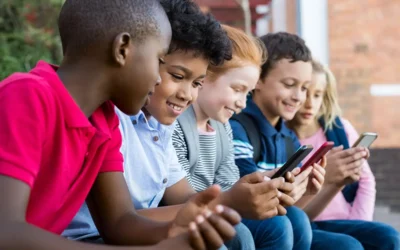Did you know an estimated 500,000 online child predators are active daily?
As students head back to school in the US, a TikTok video recently went viral reminding parents to be careful about what they included in back to school social media posts. That TikTok was the channel used to share tips on child online safety is somewhat ironic (being they are part of the problem) but the video did help promote what many experts have been saying for years: publicly publishing photos that include a child’s name, school, age and face can create big safety risks.
Speaking of TikTok…although “sharenting” is no longer big news, the “Wren Effect” is. Wren Elanor is a three-year-old from the US who has over 17 million followers on her TikTok account which documents her daily life. Wren’s mother Jacquelyn Paul who uploads these videos is under fire for exploiting her child and possibly putting her at risk. In light of this, many TikTok users sharing their children’s lives are reconsidering and deleting all public content of their children. Members of their TikTok community noted some seriously alarming stats: A video of Wren in a crop top has been saved 45,000 times; A video of Wren eating a corn dog at a fair has been saved 375,000 times.
In this Mamamia Podcast, Privacy and Cybersecurity expert Kirra Pendergast says: ‘In every session I do with students, if I ask: ‘Whose mum and dad post photos of them online without permission?’ They all put their hand up and you can literally hear the eye roll because they don’t like it”
I have always believed that sharing any personal data over the internet without considering the long-term effects will one-day emerge as a social crisis. As Facebook launched in 2004, the toddlers whose photos were captured and uploaded 18 years ago are now young adults able to fight back. Having one’s whole life publicly documented is a problem that future generations will have to face.
What exactly are the privacy implications for those who have a life-spanning of images containing private information that is easily found online? This question cannot be answered simply, but most do agree that the privacy of a child should always be at the forefront of people’s minds. This issue is an iceberg – and the tip is only just starting to appear.
Why should I care about how photos of my child are used at school?
Between the ages of 5 and 18, beyond home and family life, schools play a vital role in educating and shaping children. Parents cannot ignore the fact that schools are taking and sharing more and more photos and videos of our kids. Facebook, Instagram, Twitter, YouTube, magazines, billboards you name it, schools have used it.
Are all schools handling and storing images in a way that comprehensively minimises privacy-related risk? Having worked in this space over the last 10 years, I would say a resounding yes for some, and a resounding no for many others.
To assist those concerned about how their child’s photo is being used by the school, here are 3 common questions I get asked by parents:
Does my giving consent to school photos really matter?
YES!! Consent over your child’s personal information is vital to ensuring their privacy –it gives you control over what personal information you’re okay with the school sharing. If you don’t return consent forms, you are missing an opportunity to choose if you’re ok with what the school is proposing.
If I don’t return a consent form, does the school automatically assume I don’t consent?
Unfortunately, no. Generally, inaction is taken as a sign that you are okay with the school using your child’s photos. This is taken as “implied consent” and may result in the school doing something that would ordinarily be against your wishes.
How should a school ask for my consent?
Schools can collect, use, and disclose personal information for a wide variety of school business purposes– but there will be times when they need to ask for your permission first. For example, if a school wishes to publish images of your child taken at school on a public website or social media feed. For your consent to be valid it must be voluntary, informed, current and specific. At pixevety we call this “VICS” (a simple cure, like using VICKS Vapour Rub).
Schools can do better!
As a parent, you are entitled to ask your school to do better.
SCHOOLS SHOULD NOT:
- Make consent a “term of entry”. If, by failing to consent, you are unable to enrol in the school or register your child for an activity… the school is coercing your consent and may be a breach of its obligations under privacy law.
- Make you consent to everything at once. Asking you to consent once to 10 separate items is sloppy … This is a bundled consent. If photo use is “bundled” with other things, you cannot clearly address each item on the list.
- Be vague. If the information given by the school is too broad, you cannot know what you are consenting.
- Ask for consent with no end date. Consent must have a ‘use-by’ date and cannot be assumed to last forever. Your family’s needs and circumstances may change and so you should be able to change your consent at any time.
Parents have the power to create positive change when it comes to their children’s privacy online. By understanding the importance of school photo consent and checking in with your school on how they plan to protect student images, your effort will make positive change for both your child and your school.



